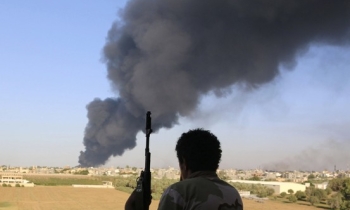It is a dark and humid night as a Tomahawk cruise missile fired from a ship sailing west of the Strait of Hormuz whizzes its way over the Qatari Peninsula and into a compound of small buildings that are turned into rubble on impact.
The missile has been fired by the United States Navy and its target is the headquarters of the Al-Jazeera satellite television network located in Qatar just four miles from the largest American military base between Germany and Japan. The attack was planned to take place deep at night to make sure that there are just a handful of people in the Al-Jazeera buildings, thus avoiding collateral damage on a big scale.
And then? Well, as soon as news of the attack is out the Al-Jazeera directors switch their operations to the nearby Qatar TV station where they can use alternative emergency facilities put at their disposal since 1998. Thus the attacked channel is back on air within less than half an hour, castigating the American "Great Satan" for its "criminal attack" and, later, broadcasting messages of sympathy from Osama Bin Laden and Abu Musab Al-Zarqawi who also don’t like being bombed by the Americans.
And then? Could the Americans deny that they had launched the missile? Hardly. They opted for the missile attack because they do not have any suicide-bombers to deploy as any self-respecting protagonist in the Middle East would. And then? What would the emir of Qatar say? Would he swallow the bitter pill in a single gulp and continue to play host to the US military base? After all, apart from the fact that he owns Al-Jazeera, the emir is also responsible for his country’s safety and security. He cannot stand back and watch his territory attacked by missile without doing anything. The least that he would have to do is to ask the Americans to pack up and go. But would they, even if asked?
Whichever way one looks at it the leaked story about an alleged suggestion by US President George W. Bush to bomb the Al-Jazeera headquarters looks like a joke used by professional anti-Americans as yet another excuse for a bit of self-righteous propaganda against the "Great Satan."
The story cannot fly for a number of reasons.
To start with the US, the land of television technology, knows well that there are enough broadcasting facilities in the world to enable Al-Jazeera, or any other TV network for that matter, to be back on air within hours, if not minutes, of losing its initial signal. These days a lot of "monkey-back" is available for peanuts. One could also think of at least one American TV network which would immediately offer to broadcast Al Jazeera’s programs if only to get at George W. Bush. In any case, as already noted Al-Jazeera has had secure back-up facilities inside Qatar for years.
Then there is the fact that no US administration could attack a media outlet anywhere in the world without being skinned alive by its own media back home. Throughout the Cold War while the USSR jammed every single Western radio and television station the US never even thought of retaliating against any Soviet media outlet. For more than four decades Cuba has served as a center for anti-American radio and television propaganda throughout the Western Hemisphere. And, yet, no US administration has ever dreamed of knocking the Cuban media out.
The US government is not even allowed to engage in what the Congress has defined as "propaganda". This is why the Voice of America, though financed by the US taxpayers’ money, makes a point of broadcasting the view of the administration with a clear caveat, often following it with one or more contradictory views.
Now supposing Washington did want to force Al-Jazeera off the air, wouldn’t there be any other way of achieving that end? Would it not be simpler to raise the issue with the Qatari government that, after all, owns and controls Al-Jazeera? The Qataris could, of course, refuse to shut Al-Jazeera as a matter of national pride. What matters for our present discussion, however, is that the issue has never been raised by the Americans.
In conversations with senior Qatari and American officials over the years this writer has always inquired whether or not Al-Jazeera’s quixotic anti-Americanism has been an issue of bilateral discussions. The answer in every case has been an emphatic No.
The real issue is not whether or not the Americans wanted to bomb Al-Jazeera but whether or not they regard it as a threat in real political and military terms.
My guess is that they don’t and, if they did, they would have little difficulty in persuading the emir of Qatar to change its personnel and policies in accordance with the strategic interests of the alliance in the current war on terror – an alliance of which Qatar has been one of the first and most energetic members from the start.
Lovers of the conspiracy theories might even argue that Al-Jazeera is doing a great job by telling the Arabs that the only choice they have is between Bin Ladenism and a status quo guaranteed by the United States. By eliminating all other options, including those of domestic liberalism and democracy, Al-Jazeera, despite its radical appearance, ends up promoting the conservative option. The reason for this is that while some Arabs might find the shenanigans of Bin Laden and Al-Zarqawi interesting from afar, few would want to be ruled by men like that.
At the same time Al-Jazeera reinforces the caricature of the Arab as a fanatic drunk on a witches’ brew of radicalism and terror. Al-Jazeera is doing more damage to the Arabs than it does to the US that, after all, is powerful enough to look after itself. The way to deal with Al-Jazeera is not to bomb it but to expose its true character as an instrument of propaganda for one strand of opinion within the Arab world – a strand that has every right to exist and express itself in freedom and security, but should not masquerade as unbiased professional journalism.









